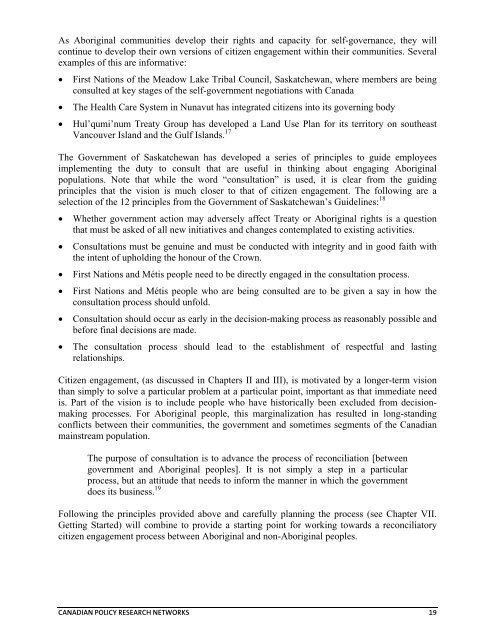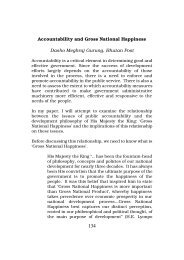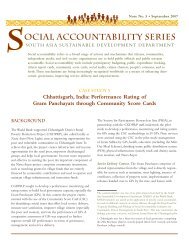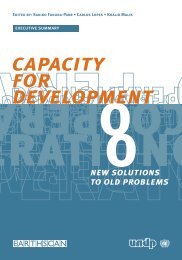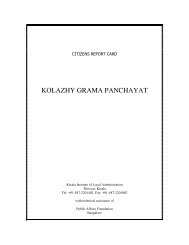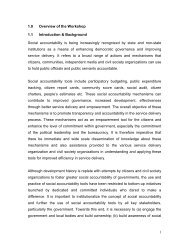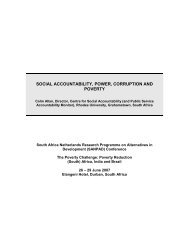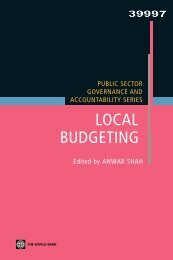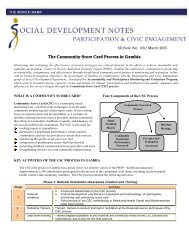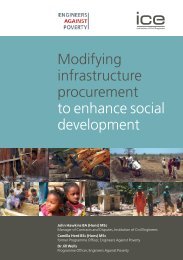Handbook on Citizen Engagement: Beyond Consultation - SASANet
Handbook on Citizen Engagement: Beyond Consultation - SASANet
Handbook on Citizen Engagement: Beyond Consultation - SASANet
- No tags were found...
Create successful ePaper yourself
Turn your PDF publications into a flip-book with our unique Google optimized e-Paper software.
As Aboriginal communities develop their rights and capacity for self-governance, they willc<strong>on</strong>tinue to develop their own versi<strong>on</strong>s of citizen engagement within their communities. Severalexamples of this are informative:• First Nati<strong>on</strong>s of the Meadow Lake Tribal Council, Saskatchewan, where members are beingc<strong>on</strong>sulted at key stages of the self-government negotiati<strong>on</strong>s with Canada• The Health Care System in Nunavut has integrated citizens into its governing body• Hul’qumi’num Treaty Group has developed a Land Use Plan for its territory <strong>on</strong> southeastVancouver Island and the Gulf Islands. 17The Government of Saskatchewan has developed a series of principles to guide employeesimplementing the duty to c<strong>on</strong>sult that are useful in thinking about engaging Aboriginalpopulati<strong>on</strong>s. Note that while the word “c<strong>on</strong>sultati<strong>on</strong>” is used, it is clear from the guidingprinciples that the visi<strong>on</strong> is much closer to that of citizen engagement. The following are aselecti<strong>on</strong> of the 12 principles from the Government of Saskatchewan’s Guidelines: 18• Whether government acti<strong>on</strong> may adversely affect Treaty or Aboriginal rights is a questi<strong>on</strong>that must be asked of all new initiatives and changes c<strong>on</strong>templated to existing activities.• C<strong>on</strong>sultati<strong>on</strong>s must be genuine and must be c<strong>on</strong>ducted with integrity and in good faith withthe intent of upholding the h<strong>on</strong>our of the Crown.• First Nati<strong>on</strong>s and Métis people need to be directly engaged in the c<strong>on</strong>sultati<strong>on</strong> process.• First Nati<strong>on</strong>s and Métis people who are being c<strong>on</strong>sulted are to be given a say in how thec<strong>on</strong>sultati<strong>on</strong> process should unfold.• C<strong>on</strong>sultati<strong>on</strong> should occur as early in the decisi<strong>on</strong>-making process as reas<strong>on</strong>ably possible andbefore final decisi<strong>on</strong>s are made.• The c<strong>on</strong>sultati<strong>on</strong> process should lead to the establishment of respectful and lastingrelati<strong>on</strong>ships.<strong>Citizen</strong> engagement, (as discussed in Chapters II and III), is motivated by a l<strong>on</strong>ger-term visi<strong>on</strong>than simply to solve a particular problem at a particular point, important as that immediate needis. Part of the visi<strong>on</strong> is to include people who have historically been excluded from decisi<strong>on</strong>makingprocesses. For Aboriginal people, this marginalizati<strong>on</strong> has resulted in l<strong>on</strong>g-standingc<strong>on</strong>flicts between their communities, the government and sometimes segments of the Canadianmainstream populati<strong>on</strong>.The purpose of c<strong>on</strong>sultati<strong>on</strong> is to advance the process of rec<strong>on</strong>ciliati<strong>on</strong> [betweengovernment and Aboriginal peoples]. It is not simply a step in a particularprocess, but an attitude that needs to inform the manner in which the governmentdoes its business. 19Following the principles provided above and carefully planning the process (see Chapter VII.Getting Started) will combine to provide a starting point for working towards a rec<strong>on</strong>ciliatorycitizen engagement process between Aboriginal and n<strong>on</strong>-Aboriginal peoples.CANADIAN POLICY RESEARCH NETWORKS 19


